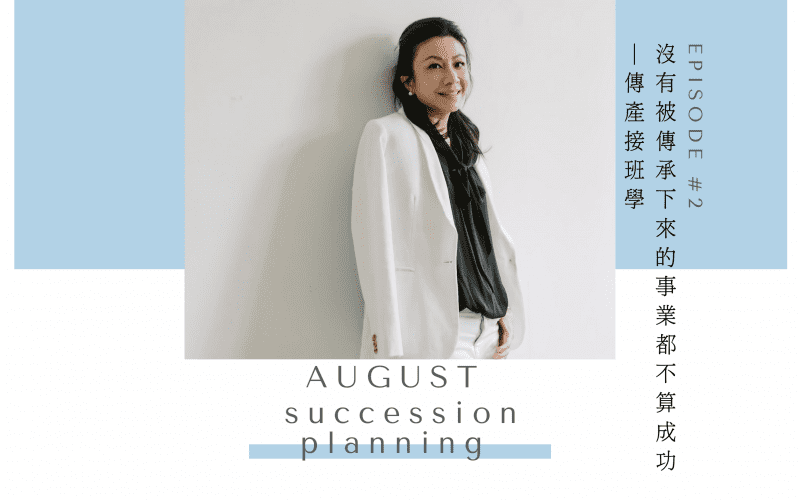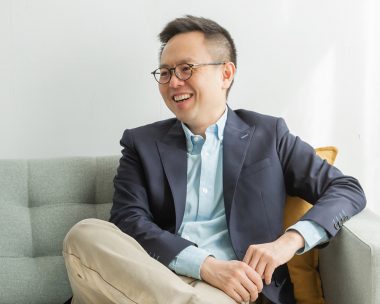This writeup is a summary and a personal sypnosis of the webinar that was hosted by GenT on 22nd July 2020, and you can find the recording here.
As Peter Drucker said, “There is no success without a successor.” How can family businesses survive and thrive as the business and wealth is handed on to the next generation, and how can a family plan ahead for this?
From the GenT webinar, we hear from 3 individuals:
- The Founder – Claire Chiang, Senior VP & Co-Founder of Banyan Tree Holdings
- The Successor – Dexter Lau, Executive Director of Kim Teck Cheong (3rd gen)
- The Expert – Cynthia Lee, Regional Head of Private Wealth Solutions, HSBC Private Banking Asia-Pacific
From this webinar, I learnt that Asia now has more billionaires than anywhere else in the world – however, they are less prepared to hand over the reins, with over 60% not having a succession plan in place. More importantly, ~85% of Asian companies are family owned. Given the influence and impact of family businesses on the Asian economies, it is even more imperative to get the conversations of succession planning going as soon as possible.
在今年七月二十二號GenT主辦了一場線上研討會,這篇文章總結了會議的內容概要。
如同 Peter Drucker所說─「沒有被傳承下來的事業都不算成功。」
家族事業在傳承給下一代之時,兩代之間如何將事業成功交棒、發展興盛,而家族成員要如何及早策畫都是艱鉅的挑戰。
在GenT的線上研討會中,聽眾能獲取這三方的建議:
- 創辦人: 悅榕股控的共同創辦人兼資深副總裁 ─ Claire Chiang
- 接班人: 金德昌控股集團的第三代執行長 ─ Dexter Lau
- 專家: 滙豐亞太區私人銀行及財富管理負責人─ Cynthia Lee
在這場線上研討會中,我了解到,亞州億萬富翁的人數比全球任何地區都還要多,但他準備好傳承的人卻是少之又少,將近60%的企業尚未制定接班人計劃。
更重要的是, 約有85%的亞洲企業為家族企業,他們對於亞洲經濟有一定的影響,因此我們迫切的需要企業盡早討論接班人計劃。
延伸閱讀: MACARONS WITH KARINE
EP2. 綜觀亞洲產業變動與女性社交網絡的秘密

By the year 2030, more than US$15 trillion in wealth will be transitioned from one generation to the next. Asia accounts for 12% of all wealth to be passed on (~US$1.9 trillion), vs US$8.8 trillion in North America and US$3.2 trillion in Europe.
Although the title of the webinar was aptly named ‘The Science of Succession Planning’, Claire Chiang pointed out that it is as much an art as it is a science. With succession planning, legal structures, processes and governance are all required and that is the science behind it. However, managing family is more an art – regardless of if the succession plan involves handing over the business to a family member or hiring professionals to take over.
To Dexter Lau, a 3rd gen leader of his family business, continuity, maintaining the legacy and continuing to build value is his priority. However, for Claire Chiang, she does not rule out having professional managers with the right skills and experience to take over, and maintaining legacy is of less importance than innovating.
From a practitioner’s perspective, Cynthia Lee shares that from experience, there is no single successful formula for any family business in succession planning. It all depends on the objective of the elders – whether it is to ensure that the next generation are provided for and taken care of and that there is a safety net, or if business legacy and continuity is just as or more important. There are also business founders that are more open-minded, and accepting that they are at the end of the business life cycle. In such circumstances, some choose to exit and with the wealth, set up a family office to focus purely on investment opportunities.
到了2030年, 將有15兆的財富過渡到下一代,亞洲佔了總額的12% (約19兆美元),而北美和歐洲分別為8.8兆美元和3.2兆美元。
雖然這場線上演討會的主題是「接班人計劃制定理論」,但Claire Chiang指出這既是一門學問,也是一門藝術。接辦人計畫背後所需的相關法規、流程、公司治理都是一門學問,但不論接班人是家族成員還是專業經理人,管理企業中的家族成員更像是門藝術。
對第三代接班人Dexter Lau來說,他的首要目標是公司持續穩定的成長、重返企業的榮耀、再創企業價值;但對Claire Chiang而言,他認為比起延續企業的輝煌史,創新是更重要的,他不排除讓有才華的專業經理人接管企業。
身為受雇者的Cynthia Lee根據自身的經驗提出了一些觀點 ── 沒有一個完美又萬用的公式能解開家族企業的接班企劃中每個難題。接班是否順利完全取決於老臣們願不願意關照下一代的接班人、給予其資源和保護網。

The rise of the family office is not just a consequence of businesses reaching the end of their life cycle, but also an organized approach to diversifying and looking for opportunities in the global markets. As of 2019, there were 1300 family offices in Asia managing about US$4 trillion in assets – more than all the hedge funds combined and about ~6% of the value of the world’s stock exchanges. The family office also performs the role of instituting a governance process and acts as an execution platform for deals & investments outside of the family’s core business. As a business is handed down, there is often a shift from single to multiple decision maker, and in this scenario having a family office acting as a neutral party to oversee the administration can make the process smoother.
When it comes to making decisions, it is important for everyone around to the table as stakeholders to prioritize the collective interest of the family before their personal interests. With a family office, structures such as a family council can be set up and allow for business matters to still be discussed in a family setting. An external neutral party like a consultant would also be able to facilitate collective decision making.
The founder/ leading generation and the generation taking over will certainly have different approaches to running a business and perhaps different value systems. On average, it takes about 10 years of intensive transition for a successor to be groomed. Aside from running the business, building trust & affection amongst the family members, and establishing accountability and transparency are also key to making the transition work. While there might be some best practices, the dynamics within every family is different and it also depends on the size of business and extent of family members involved.
家族財富管理機構 (Family office) 的崛起不僅是企業生命週期即將結束的結果,也是以組織化的方式來實現多元化經營,並在全球市場中尋找機會。 截至2019年,亞洲有1300個家族財富管理機構,他們管理著約4萬億美元的資產,這個金額超過所有對沖基金的總和、佔了全球證券交易所價值的6%。這些財富管理機構還扮演著建立治理流程的角色,並充當家族核心業務以外的交易和投資的執行平台。 隨著業務的傳承,通常決策者會從一個決策者轉變為多個,在這種情況下,由家族財富管理擔任中介來監督行政部門可以使流程更加順暢。
在決策時,每位利害關係人都必須優先考慮家族的集體利益,而不是個人利益。 透過家族財富管理,就可以建立家族理事會,並促成家族成員討論相關的業務事項。 家族財富管理機構中顧問能扮演外部中立的角色,促進集體決策。
創始人一代和新一代接任者肯定有著不同的經營理念和價值觀。
通常一個接班人,大約需要10年的精心培育。除了治理公司之外,與家族成員建立信任和連結、建立問責制和透明度,也是進行過渡工作的關鍵。 儘管可能有萬用的公式,但每個企業內部的情況、業務規模和家庭成員參與的程度都不盡相同。
延伸閱讀: 用茶見證大稻埕女性的崛起,用創新傳承五代好茶—
有記名茶 JASON 王聖鈞
In the next few releases of this special issue on working in traditional industries/ family businesses, we will also cover topics such as the benefits of working in such an environment, how to innovate in such industries, a case study on one such business as well as looking to successful family/ traditional businesses that have transcended not just 2-3 generations but more, as with the case of Japan/ Germany.
在之後的Special issue 中,我們會延續「在傳統產業/家族企業」這個主題,來談談在傳產工作的好處、如何在傳產中進行創新,以及不同家族企業的案例。例如日本及德國的悠久企業,是如何成功傳承許多世代的。
延伸閱讀: 一個傳產大叔為什麼 CAREHER 的真心話








